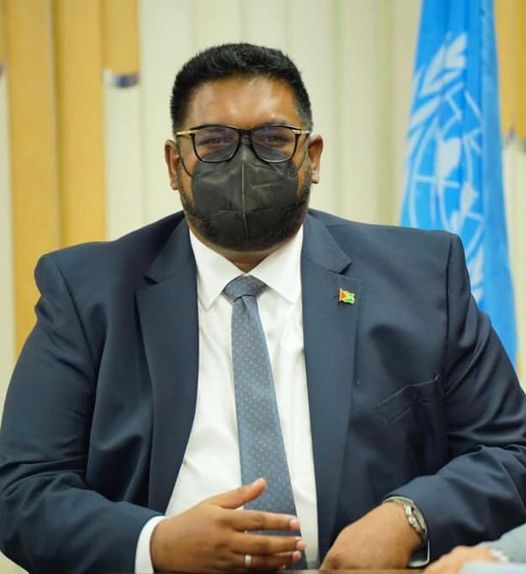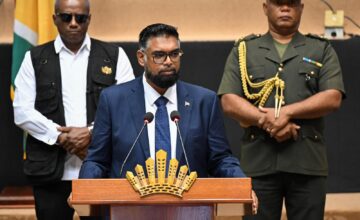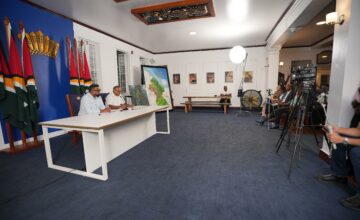
-Tells MERCOSUR about plans to hold mini-summit to discuss energy corridor
Georgetown, Guyana—(December 17, 2021) His Excellency Dr Irfaan Ali today told members of the South American trade block MERCOSUR that Guyana intends to bridge the gap between the continent and the Caribbean and function as a new ‘energy pole’.
The President in his address to the 59th Summit of the regional body pointed out that Guyana supports MERCOSUR’s efforts to foster infrastructure, integration, and increase connectivity.
He said that the country would enhance development opportunities in the continent’s northern flank through collaborations and joint partnerships.
“Along with Brazil and Suriname, we hope to leverage our energy resources for energy security, agriculture and food security and to potentiate growth and development opportunities in the northern flank of South America.”
To start the process, the Head of State announced that very early in the New Year, there will be a summit between Guyana, Brazil and Suriname to discuss the development of the Corentyne frontier, the logistic importance of a deep-water harbour and the energy corridor.
He said that Guyana is pleased to be associated with MERCOSUR, with a view to advancing its development and integrating into the “South American fraternity as part of our continental destiny”.
The President told the outgoing rotational head of the block, Brazilian President H.E Jair Bolsonaro and other regional leaders that lessons from the pandemic must serve as a guideline to the future.
A healthy South America, he noted, is critical to the resiliency and sustainability of the region.
“A strengthen multilateral system is needed to ensure that every region, every country, has more equitable and ready access to deal with pandemics and other threats to public health.”
He added that it is vitally important to enhance the capacity and capabilities of regional, sub-regional and national institutions in surveillance, research, and production of vaccines and other vital agents and technologies.
Although the focus was to ensure that South American nations put measures in place to safeguard the health of their people; the President pointed out that it was also important to build resiliency and reorganise economic activities with the hope of stimulating sustainable growth, improving public services and social safety nets and expanding opportunities for trade and investment.
He said regional integration must encompass a drive for sustainability and pointed to confronting, head-on, the existential threat already posed by climate change.
“The most vulnerable are at grave risk if we do not act. It is imperative that the global warming trajectory be contained within 1.5 degrees Celsius.”
The President also highlighted Guyana’s Low Carbon Development Strategy and pointed to its many benefits.
“This strategy aims to transform Guyana’s economy to better deliver socio-economic benefits to our people by following a low carbon path while mainstreaming climate resilience, providing a model to the world of how low carbon, low deforestation, climate-resilient development can be possible and beneficial for forested countries.”
He reminded the Heads of State that as a block, South America should remain focused on the elements of COP26, such as the requisite mitigation ambition, adequate support for adaption and climate finance.
Working together as a regional block, according to President Ali, would chart the way forward to ensure that as a collective, the continent builds back “stronger and safer, to create a more equitable, secure, resilient, and sustainable future for our peoples”.


